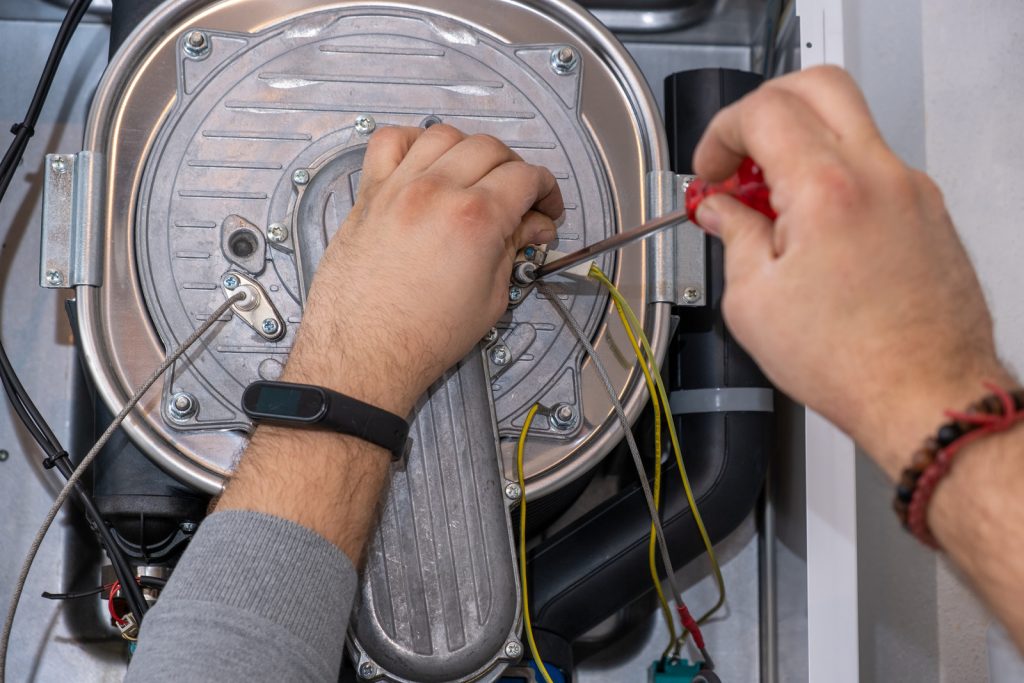The cost of moving a boiler within the same room will cost between £250 and £300. If you want to move it to a different room on the same floor, expect to pay £450. If moving it to a higher or lower floor, on average this can total up to £700 even if buying and moving a new boiler.

Why move a boiler?
The most common reasons for moving a boiler are to free up space, to make the room aesthetically better, to move it away from bedrooms because of noise or to shorten the distance to the bathroom for hot water speed. There are many other reasons to move a boiler and we look at what’s involved and how much it costs.
What’s involved in moving a boiler?
A typical boiler move involves disconnecting the gas, water, flue pipes and electrical wiring to the boiler; moving and fixing it to the new location along with new, possibly bigger pipework, electrical connections including controls and thermostats, and drilling the new hole for the flue pipe.
Also have to think about covering or redecorating the wall where the boiler was.
Why are boilers usually in the kitchen?
Boilers, especially combi boilers, are usually found in the kitchen for the convenience of both the homeowner and the engineer. For the user, the noise of the boiler won’t affect the household as much as in the bedroom it is closer to the kitchen tap for speedier hot water flow and is rectangular in shape like the cabinets.
For the engineer, the gas supply pipe normally needs to run into the kitchen anyway for the cooker and water pipes for the sink so this reduces the need for extra pipework.
Condensing combi boilers also need to discharge condensate so the drains are close by for this. Kitchens usually have external walls which is convenient for the flue pipe
Moving boiler regulations
Because there can be many scenarios, it’s best to check with a gas safe registered engineer if your boiler can be moved under current regulations, or contact the Gas Safe Register yourself.
You also have to ensure parts such as flues that can be easily damaged during the move are still available for the boiler.
The same regulations mostly apply when moving a boiler as installing a new one: the installer must follow gas safety and building regulations that are applicable today when moving it.
The thing to bear in mind is that regulations may have changed since the boiler was installed and what was allowed then may not be now.
Can old boilers be moved?
Old boilers can be moved but you will need to check whether replacements parts are still available should something break while moving. Components and flues in old boilers can break easily and on many occasions, it may be better to either leave the boiler where it is or buy a brand new boiler for the location you want it in.
Where can you move a boiler to?
Modern combi boilers can be moved to almost any convenient location in a house, as long as it’s a room sealed boiler i.e. where the air for combustion is taken from outside the property instead of within the room.
If it’s easily accessible to service and repair, you could move it to the loft, bathroom or even the garage.
Where is the best place to move a boiler?
The best place to move a boiler will depend on your circumstances. If you need quiet in the bedrooms, move it to the garage. If you have a large hot water demand, move it to the bathroom, if it’s getting in the way, move it to the attic.
If you don’t want pipework all over the house, put it in the kitchen.
Can the national companies move my boiler?
Most companies, including national brands such as British Gas and Eon, won’t move your existing boiler. But if you are buying a new boiler from them, they will install it in the location that you choose at an extra cost.
If you want to move your current boiler, you will need to contact a local company.
*The information in this article should be used for general guidance only and not as financial advice. Full details are on the link in the footer to our disclaimer page. Always discuss your requirements with a competent and suitably qualified professional before undertaking any work.
Affiliate disclosure Heatology.co are participants in a variety of affiliate schemes which help fund and run this website, visitors who follow our links and purchase a product may earn Heatology.co a commission. The money we make from affiliate marketing costs you nothing but keeps us online, so thank you for your continued support!
